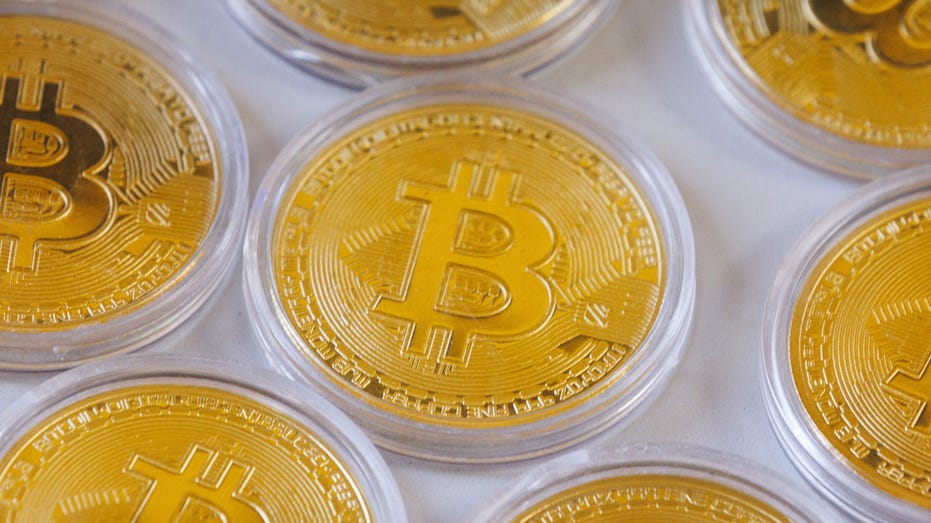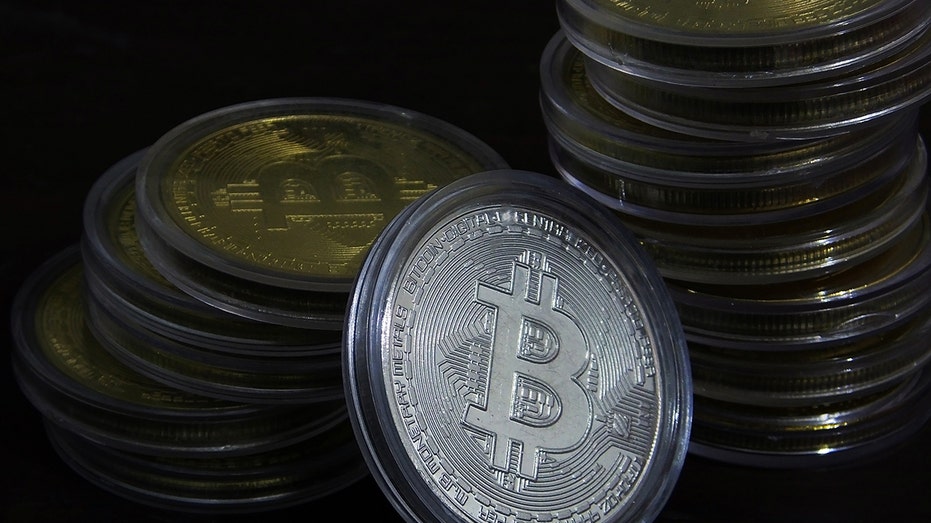Kudlow: Radical progressives will try to regulate digital currencies
Kudlow argues Bitcoin has a libertarian soul.

Larry Kudlow (FOX Business)
Tonight, we need to talk about cryptocurrencies, sometimes called digital currencies, sometimes even called alt-currencies.
These currencies are traded outside the banking system. They have been developing their own digital ecosystem and, yes, their prices can fluctuate quite a bit.
Of course, we've seen it recently. Just on a year-to-date basis, the digital currency exchange company, Coinbase, is off 72%. The most widely traded alt-currency, Bitcoin, is down 37%. Another widely held is Ethereum; it's down 44%.
BITCOIN'S TERRIBLE WEEK: WHAT HAPPENED?

Illustrative bitcoin tokens at a Bitcoin Change bureau in Tel Aviv, Israel on Wednesday, Feb. 2, 2022. (Photographer: Kobi Wolf/Bloomberg via Getty Images / Getty Images)
According to surveys, 16% of Americans own cryptocurrencies — quite an increase from the 1% who owned them in 2015, according to the Pew Foundation survey.
The Coinbase exchange has 90 million people involved, according to their documents. Overall, there were $2.9 trillion worth of digital currencies in market circulation through November. In November 2020, there were only $500 billion circulating. So, you can see this huge quantum leap. One way or another, in one form or another, I think digital currencies are here to stay.
I would say, first and foremost, the issue of digital currencies is the fact that it's an internet thing. It's internet-based. It's internet-driven. It's internet-traded and at least at the moment, it is not run by the Federal Reserve, the Treasury, or other government regulators of the marketplace, and that was always the spirit of the thing when it got started years back. Think of Bitcoin as having a libertarian soul.
During the Trump administration, we talked and thought about digital assets. One big debate was whether Bitcoin, for example, is a currency, in the classical sense of providing efficient transactions. Is it a commodity or is it just a plain investment?
Currencies versus commodities versus investment labels would matter for regulatory purposes, but none of these issues have been decided yet.
Institutionally, the Federal Reserve and the Treasury staff have always disliked digital money because they can't control it and those folks like to control, which is probably one of the biggest problems for our whole economy, let alone alt-currencies
WHITE HOUSE BURIED OVER TWEET CLAIMING THERE WAS ‘NO VACCINE’ WHEN BIDEN TOOK OFFICE: ‘DELETE THIS’
The point of Bitcoin is to build a system that can't be politicized: Expert
Bitfury CEO Brian Brooks provides insight on cryptocurrency on 'Kudlow.'
Investors are very upset now because they have lost a lot of money in recent weeks, and I get that and I feel their pain, but a lot of risk assets have lost a lot of money in recent weeks.
The NASDAQ is off 27% year to date. Consumer discretionary stocks have lost 29%. Telecom is down 27%. Infotech 25%. Want more?
Well, the semiconductor index is down 28%. S&P Homebuilders is down 24%. S&P Retail is down 29%. JPMorgan Chase is down 25%. Citigroup is down 23%. Goldman and Bank of America are down 22%.
So, with inflation rising and market interest rates going up and the Federal Reserve swearing on their Bibles on a daily basis that they're going to drain liquidity from the inflated economy, it's been a rough year no matter what you own—whether you own bonds, stocks, leverage loans, junk bonds, Bitcoin. Really outside of energy, investing hasn't been that much fun this year.
So, the digital currency world has been hit hard, harder than other asset classes. But, you know, as Jimmy Carter once said in his finest moment, some things in life aren't fair. When investors invest, they should have their eyes wide open.
I hate to see anyone lose money, but in a free-market capitalist system, it happens. I'm surprised Joe Biden hasn't blamed the high inflation crisis and his collapsing poll numbers on Bitcoin. It's about the only thing he's left out of his laundry list.
BIDEN ADMIN ANNOUNCES MEASURES TO ADDRESS BABY FORMULA SHORTAGE

A view of the physical coins of Bitcoin, Yichang, Hubei Province, China, December 4, 2021. ( Liu Junfeng / Costfoto/Future Publishing via Getty Images / Getty Images)
I'm going to bet that the radical progressives in his administration will oppose digital currencies and try to control them and regulate them to death, just the way those progressive central planners and big-government socialists want to regulate and control everything else in the economy. That's my hunch.
Finally, I think there will be some movement for more transparency in the digital currency world, particularly the exchange companies, although they are already covered by the SEC. Investors will want to know more about reserves behind these companies, and capitalization behind these companies and will look for some standardization in their accounting and their reporting.
Now that could be done voluntarily by the digital currency people themselves—there's an interesting thought. In our banking system, remember, the FDIC provides $250,000 to guarantee deposits and SIPC guarantees $500,000. I doubt if digital currencies or their exchanges will get anything like that protection in the foreseeable future and frankly that suits me just fine.
CLICK HERE TO GET THE FOX NEWS APP
Crypto market has found a 'temporary bottom': Bitcoin Foundation chairman
Bitcoin Foundation Chairman Brock Pierce says his beliefs on the crypto market haven't changed due to its recent price plunge.
The interesting final thought for me is, you know, gee whiz, you know, the dollar. If it were really King Dollar, if it were really backed by a reliable standard of value, if we really knew our Central Bank was keen on defending the value and purchasing power of our dollars, if we really embraced King Dollar—then this alt-currency movement might not have grown up quite so fast.
Then again, the inflation wouldn't be so high, and the risk of the economy sinking wouldn't be so high. Just saying.
So folks, live a little. Take a couple risks in life. Digital currencies might be one of them.
This article is adapted from Larry Kudlow's opening commentary on the May 13, 2022, edition of "Kudlow."






















